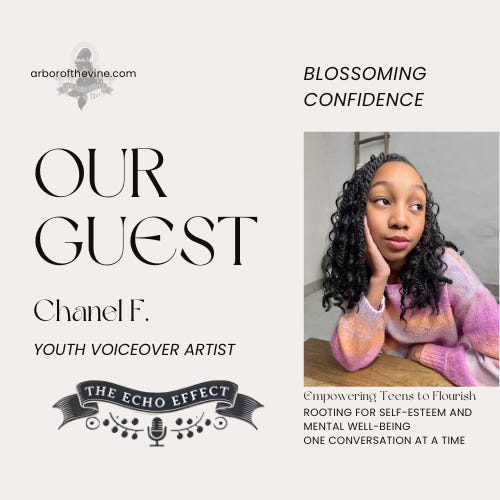In recognition of National Teen Self-Esteem Month, we take a comparative look at teen and adult mental health. Even in our common ground, teens are developing a growing resilience to challenges and overcoming the same difficulties faced by adults. We'll hear from a young lady who highlights the ways in which she's coping and rising towards endless possibilities.
Interview and article by Jenny Cline featuring Chanel F., Echoes & Vine Magazine Youth Voiceover Artist
Listen to the full podcast with Chanel on The Echo Effect's 'Echolettes' series, only on Spotify.
Mental Health Concerns
Given that 20.17% of teens experience major depressive episodes and 31.1% of adults experience anxiety disorders, what strategies do you use to prioritize your mental well-being?
Sometimes life just feels like… a lot. School, friends, family stuff, it can all pile up. When that happens, I’ve learned to slow down and do simple things that help me feel better. I’ll listen to music, draw, play with my friends and spend time with my family. That helps me not keep everything bottled up.
Talking to my mom or one of my friends helps too. Even if they don't know it all, just talking things out makes it not feel so heavy. I've also gotten better at being able to say, "Hey, I need a break" or "I don't really want to talk right now." And that's okay. I think more of my peers are getting comfortable talking about how they feel, and that's a good thing. Asking for help doesn't mean there's something wrong with you, it just means you're trying to take care of yourself, and that's actually healthy.
Social Media and Technology
With nearly half of teens online almost constantly and 73% using social media to learn about social issues, how do you navigate the benefits and drawbacks of social media? What strategies help you maintain a positive online presence?
Social media's kind of like a mixed bag, it's wonderful, but it can also play games with your head as well. I enjoy using it to post with friends, find outfit ideas, or see cool videos and edits. However, sometimes there's too much, particularly when everyone's just sharing their "perfect" world or there's drama everywhere.
What truly works is keeping my feed positive and full of good vibes. If a person's posts drain me or make me question myself, I just unfollow, to just keep my peace. I follow pages that make me happy, inspire me, or brighten my day. And when I post, I don't pretend to be perfect. If it's silly, spontaneous, or just for kicks, that's okay too. No pressure, no stress.
Also, I need to prompt myself to log off sometimes. I set boundaries or timers so that I don't scroll forever. Balance is everything. Social media's cool, but real life is more precious, especially your feelings.
Bullying and Peer Pressure
Considering that workplace harassment remains a significant issue among adults, 19.5% of high school students experience bullying, and yet 64% of teens have supportive friend networks, what qualities make a friendship strong and supportive, especially during tough times? How do you build relationships that provide emotional support, and how do you help others feel seen and supported?
A good friend is one you don't really have to pretend with, and you can be your goofy, quirky self, and they're okay with it. My best friends try to inspire me to be the best I can be, which I try to do the same for them. And when I'm not feeling great they cheer me on.
In terms of issues, like peer pressure or bullying, having backup is a huge thing. I'm that kind of friend, if someone appears upset or is being left out, I'll get involved or invite them in. Even a casual, Hey, are you okay? Can be magical. I also take care to remind my friends that it's okay about what they're going through.
You don't have to solve it. You just have to listen. Every now and then and I ever feel someone is pressuring me to do something I don't wanna do, I stay true to my feelings. Good friends don't pressure you. They encourage you. Being a good friend has nothing to do with being popular. It's about being present, being kind, and ensuring that no one's ever alone.
This article is intended to provide motivational and inspirational content. However, if you are experiencing thoughts of depression, suicide, or other mental health concerns, please seek help from a qualified medical or mental health professional.
In the United States, you can dial 988 or call the National Suicide Prevention Lifeline at 1-800-273-TALK (8255), and text the Crisis Line at 741741.
For international emergency care, please visit helpguide.org, which lists global helplines and crisis centers. Remember, support is available, and there is help for those who need it.
Based on recent data, here is a comparison between teens and adults across various mental health and social factors:
Mental Health Concerns
Teens: Approximately 20.17% of U.S. adolescents aged 12-17 reported experiencing at least one major depressive episode in the past year (Mental Health America 2024).
Adults: In 2024, an estimated 57.8 million adults in the United States (about 19% of the population) had a mental illness, but only 43% received any form of mental health care (The Zebra 2024).
Positive: In 2024, 70.4% of adolescents aged 12-17 reported having a positive relationship with their family, which can help mitigate mental health concerns (Mental Health America 2024).
Social Media and Technology
Teens: Nearly half of U.S. teens (46%) reported being online almost constantly, with platforms like YouTube, TikTok, Instagram, and Snapchat being widely used (Pew Research Center 2024).
Adults: Data specific to adults' social media usage in 2024 is limited. However, previous studies indicate that adults also engage significantly with social media platforms, though usage patterns may differ from those of teens.
Positive: In 2024, 73% of teens reported using social media to learn about social and political issues, indicating a positive trend in civic engagement (Pew Research Center 2024).
Bullying and Peer Pressure
Teens: In 2019, 19.5% of high school students reported being bullied on school property (Centers for Disease Control and Prevention 2019).
Adults: Workplace harassment remains a significant issue among adults (Equal Employment Opportunity Commission 2024).
Positive: 64% of teens who have made a new friend online say they have met new friends on a social media platform, which social networks may help reduce the impact of bullying (Lenhart 2015).
References:
Centers for Disease Control and Prevention. 2022. "Mental Health Surveillance Among Children—United States, 2013–2019." MMWR Surveillance Summaries 71 (2): 1–28. https://doi.org/10.15585/mmwr.su7102a1.
Lenhart, Amanda. 2015. "Teens, Technology and Friendships." Pew Research Center. August 6, 2015. https://www.pewresearch.org/internet/2015/08/06/teens-technology-and-friendships/.
Mental Health America. 2024. "Youth Data 2024." Mental Health America. Accessed February 2025. https://mhanational.org/issues/2024/mental-health-america-youth-data.
Pew Research Center. 2024. "Teens, Social Media and Technology 2024." Pew Research Center. Accessed February 2025. https://www.pewresearch.org/internet/2024/12/12/teens-social-media-and-technology-2024.
The Zebra. 2024. "Mental Health Statistics in 2025." The Zebra. Accessed February 2025. https://www.thezebra.com/resources/research/mental-health-statistics.
U.S. Equal Employment Opportunity Commission. 2024. "Enforcement Guidance on Harassment in the Workplace." Last modified April 29, 2024. Accessed February 2025. https://www.eeoc.gov/laws/guidance/enforcement-guidance-harassment-workplace.
Read more from Chanel.













